Key takeaways:
- Artist development is a holistic process that nurtures both musical skills and personal identity, fostering deeper connections with audiences.
- Collaboration with a skilled support team, including producers and marketers, is essential for an artist’s growth and navigating the music industry effectively.
- Emphasizing originality, emotional depth, and a strong work ethic is crucial when selecting artists for development, as these traits enhance their potential for lasting success.
- Building genuine relationships with artists fosters trust and creativity, significantly impacting their artistic journey and narrative sharing.
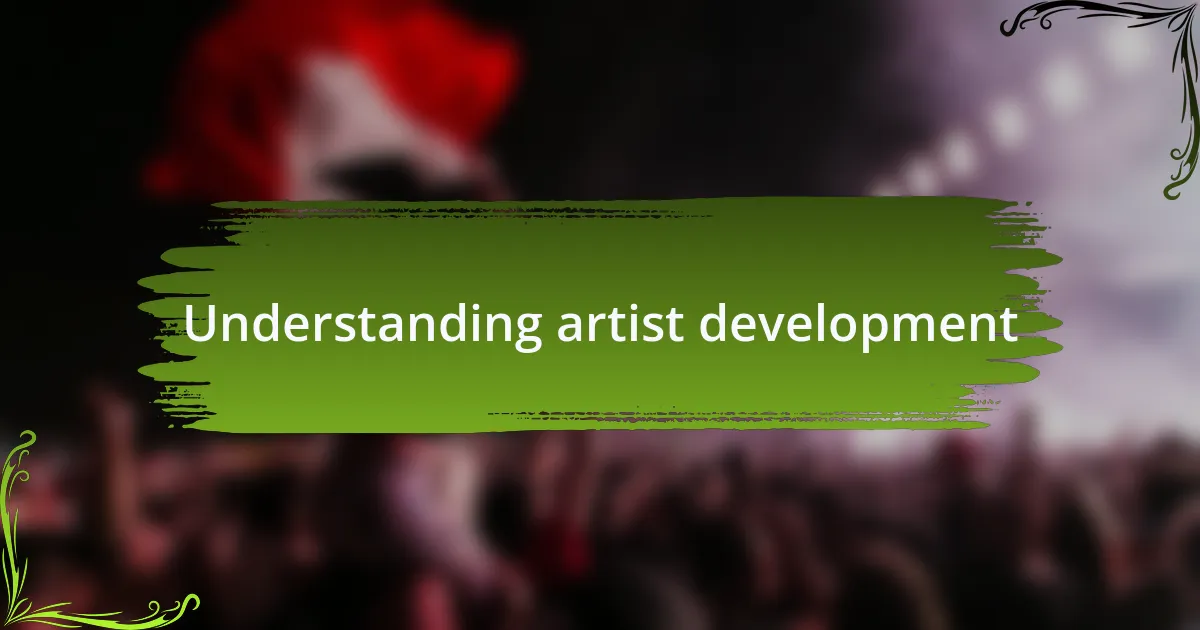
Understanding artist development
Artist development is a multifaceted process that goes beyond simply honing a musician’s technical skills. It involves nurturing their unique identity and guiding them through the complex landscape of the music industry. I often wonder, how many emerging artists realize that their artistry is as much about personal growth as it is about musicality?
In my experience, I’ve seen artists blossom when they embrace vulnerability in their creative journey. I remember meeting a vocalist who initially struggled with self-confidence, but through focus on artist development, she discovered her voice—not just in singing, but in sharing her story. This personal connection resonates deeply with audiences. It makes me ask: how can an artist truly connect with listeners if they don’t first explore and understand themselves?
Additionally, artist development requires a collaborative effort between the artist and a team of professionals, such as producers, songwriters, and even marketers. Each member plays a crucial role in shaping the artist’s vision. Reflecting on my interactions in the music scene, I’ve seen great ideas thrive because of open communication and a shared passion for the artist’s growth. Ultimately, it’s in this synergy that an artist can navigate their path creatively and authentically.
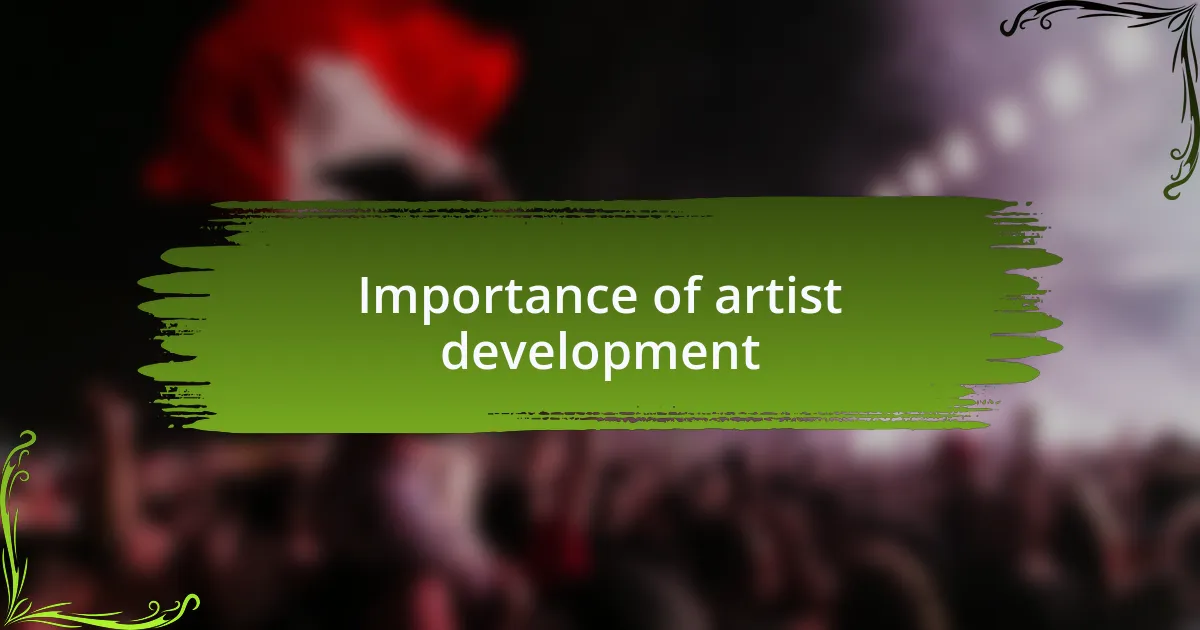
Importance of artist development
The importance of artist development cannot be overstated; it is the backbone that supports an artist’s journey toward success. I recall witnessing a talented musician struggling to find his audience. Through targeted development, he learned to refine his sound, enhancing his emotional expression in performances, which ultimately led to deeper connections with fans. Isn’t it fascinating how a little guidance can change the trajectory of an artist’s career?
Moreover, artist development fosters adaptability in an ever-evolving industry. When I worked with a young band looking to break into the music scene, we focused on not just their musical style but also their branding and market presence. They learned to embrace feedback and adjust their approach, which is vital in a landscape where trends shift rapidly. How else could they stay relevant if not by evolving alongside their audience?
It’s also about long-term sustainability. I’ve seen many artists achieved short-lived success, often due to a lack of foundational growth. One emerging singer I mentored initially experienced wild popularity but soon faded away. Had there been a solid artist development plan in place, that momentum could have transformed into a lasting career. This makes me consider: what does it take to build a legacy in music?
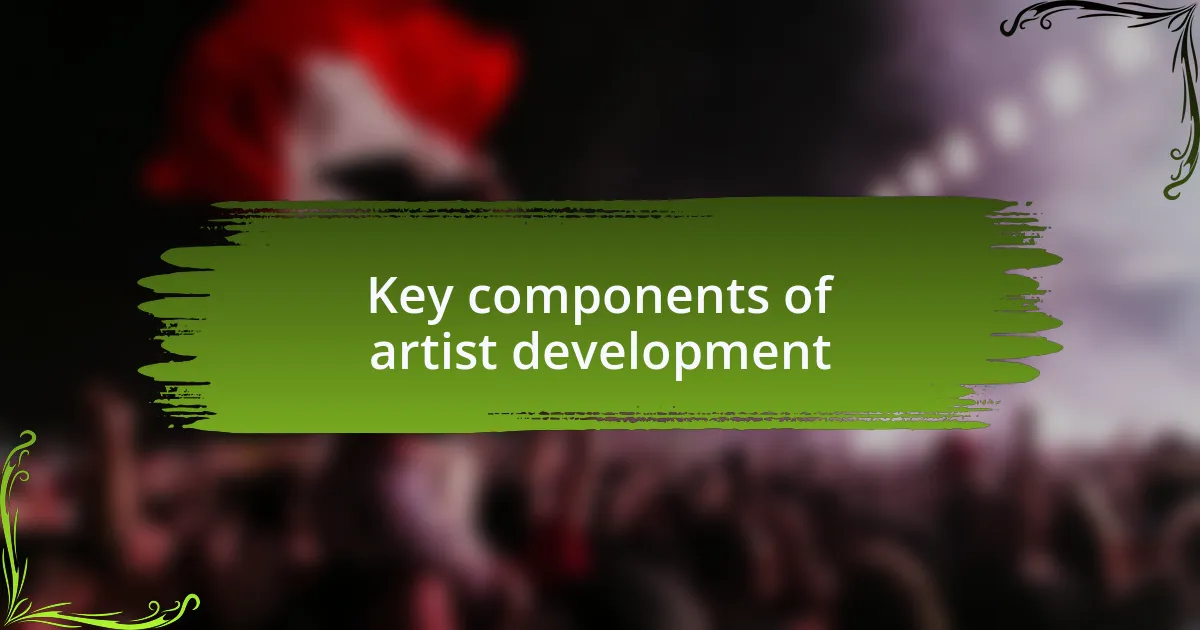
Key components of artist development
Key components of artist development involve several crucial elements that play a significant role in shaping an artist’s identity and career trajectory. For example, I’ve often seen the impact of honing a unique sound. A friend of mine, an indie singer-songwriter, spent months exploring different genres and writing styles before landing on a sound that truly resonated with her. This process not only distinguished her from the multitude of artists but also allowed her to convey her emotions authentically, creating a genuine connection with listeners. Isn’t it remarkable how vital finding one’s voice can be?
Another key aspect is market understanding. During my time collaborating with a budding electronic artist, we delved into audience analytics and streaming data. By examining who was listening, where they were from, and what they enjoyed, he could tailor his releases to meet audience expectations. As a result, he saw a notable increase in engagement. This makes me wonder how many artists miss out on potential growth by not fully leveraging available data?
Lastly, we can’t overlook the importance of a strong team behind an artist. A well-rounded support network, whether it be managers, publicists, or social media strategists, is essential. I once worked with a duo that had phenomenal musical chemistry but struggled without the right guidance on branding and marketing. Once we brought in a professional to help craft their narrative, everything changed. I believe that an artist is only as strong as the team that supports them. How much further could emerging artists go with the right people in their corner?
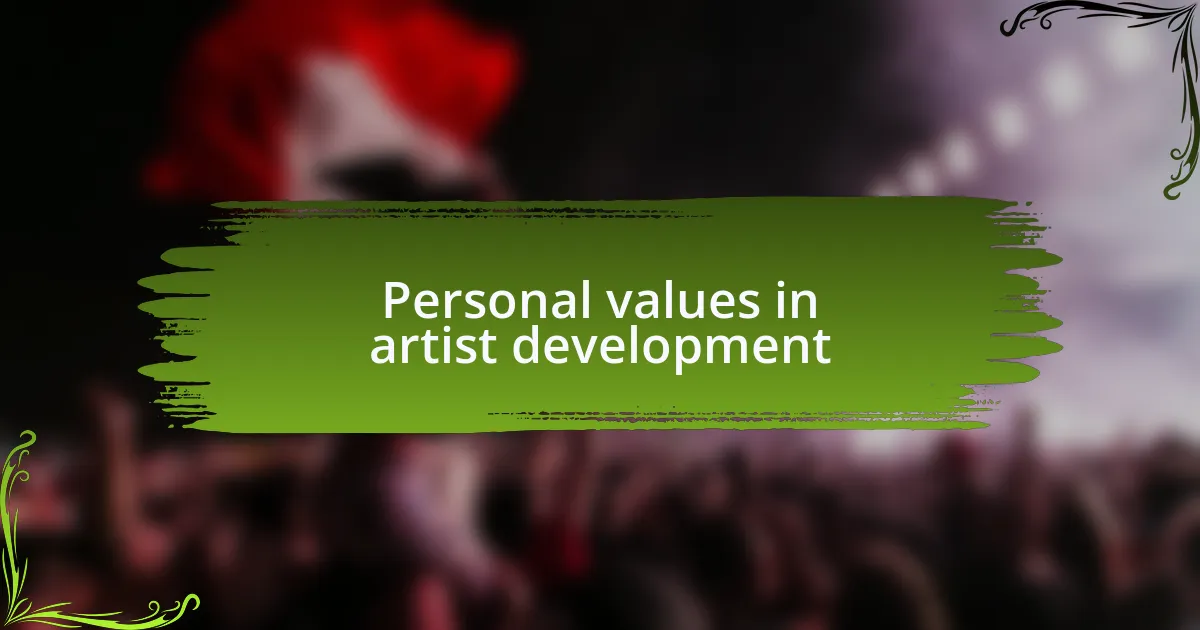
Personal values in artist development
In the journey of artist development, personal values play a pivotal role in shaping an artist’s direction and authenticity. I recall working with a young rapper who infused his cultural roots and personal experiences into his lyrics. He often said, “If my story doesn’t resonate with me, it won’t resonate with anyone else.” This profound commitment to authenticity not only enriched his music but fostered a loyal fan base that connected deeply with his narrative. How essential is it for artists to stay true to themselves in an often superficial music industry?
Another value I deeply appreciate is resilience. During my time mentoring a pop artist, she faced constant rejections from labels. What struck me was her unwavering determination; she used each setback as fuel to improve her craft. I often ask myself, how many artists could reach their full potential if they embraced rejection as a stepping stone rather than a roadblock? This resilience not only polished her artistry but ultimately led to her breakthrough moment, proving that perseverance can pave the way to success.
Moreover, the value of collaboration cannot be overstated. I still vividly remember a project with a diverse group of musicians, each bringing their unique styles to the table. This collaborative spirit transformed our creative process, allowing us to blend genres in ways we never anticipated. It made me wonder, how often do artists limit themselves by not venturing outside their creative comfort zones? The beauty of collaboration lies in its ability to enhance creativity, creating something truly special that reflects various perspectives and experiences.

Criteria for selecting artists
When selecting artists for development, I prioritize their capacity for originality. I once came across an emerging indie singer whose sound was refreshingly distinct; she wove together elements of folk and electronic music in a way that felt entirely fresh. It made me realize that in a market saturated with similar sounds, true originality stands out and captures attention. How often do we hear the same formulas repeated, yet the artists who break the mold become the ones we remember?
Equally important is an artist’s emotional depth. I recall working with a songwriter who could take a mundane story and transform it into something deeply relatable and profound. During our sessions, his passion was palpable, and you could feel the authenticity in every lyric he penned. It raises an interesting question: how can artists connect with listeners if they don’t possess that emotional authenticity themselves? This connection is what elevates music from mere entertainment to a shared human experience.
Lastly, I cannot overlook the artist’s work ethic and commitment to growth. I once collaborated with a musician whose relentless pursuit of improvement was inspiring. She would spend hours perfecting her craft, and her willingness to learn from criticism was refreshing. It led me to contemplate: can any artist truly reach their potential without a strong dedication to their craft? This blend of commitment and passion is essential for anyone looking to make a lasting impact in the music industry.
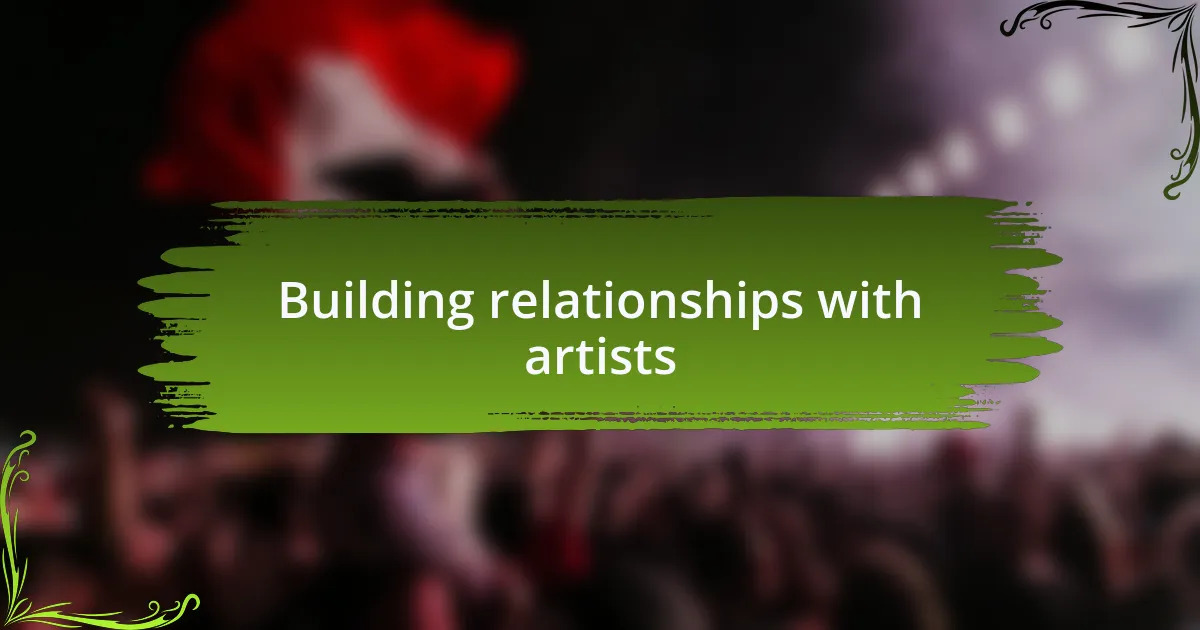
Building relationships with artists
Building relationships with artists goes beyond mere professional interactions; it’s about creating a genuine connection. I remember meeting with a young rapper at a local coffee shop. As we discussed his aspirations, I could see the passion in his eyes. It made me think: how can we effectively support an artist if we don’t understand their motivations and fears? Establishing trust fosters creativity and opens the door for honest conversations about their music, which is invaluable for their growth.
One of the most enlightening experiences I had was organizing a small showcase for a group of indie artists. In the weeks leading up to the event, I made it a point to meet each artist individually and learn about their journeys. There was something powerful in understanding their stories—the sacrifices they made and the dreams they chased. This connection not only enriched my writing but also transformed how the audience received their performances. It left me wondering: what stories might be lost if we don’t take the time to build these relationships?
In my experience, the emotional bond between a journalist and an artist can significantly influence the narratives we share. I once collaborated with a talented singer-songwriter whose struggles with mental health were intricately woven into her music. Our discussions revealed layers of vulnerability that made her songs resonate even more deeply with listeners. It struck me then that our role isn’t just to report on their art, but to amplify their voices and foster an environment where they feel seen and understood.
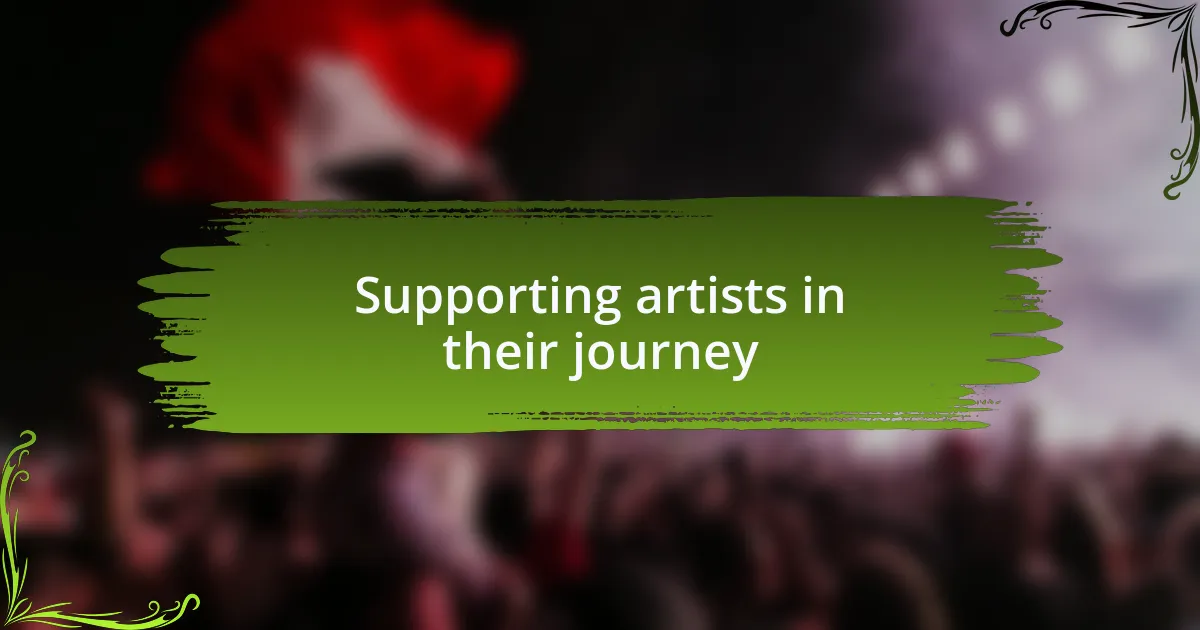
Supporting artists in their journey
Supporting an artist on their journey is about providing guidance and encouragement when they need it most. I recall a time when a talented musician was on the brink of giving up after a series of rejections from labels. I reached out to him with a simple message letting him know I believed in his talent. That small act of support sparked a renewed sense of purpose in him, reminding me just how impactful a few kind words can be.
It’s fascinating how a little encouragement can launch someone’s career. I once mentored a young band that was struggling to find their sound. We spent countless hours in my studio, experimenting with different styles. Those sessions became a safe space for creativity and exploration, allowing each member to thrive without the fear of judgment. It’s moments like these that remind me of the importance of fostering an environment where artists can take risks and grow.
In my observation, the most successful artists often have a network of supporters behind them. I was fortunate enough to witness one artist turn a tough period into a breakthrough moment with the right support. This artist was hesitant to share specific stories from her life, but when I encouraged her to be authentic, it resonated with her audience like never before. The connection forged was undeniable, raising the question: what heights can we reach when we dare to be vulnerable together?